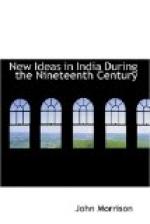“Trailing clouds of glory do we
come
From God who is our home,”
and
“The faith that looks through death.”
[Sidenote: Transmigration now no more than a conventional explanation of how misfortunes befell one.]
Somewhat dreamlike Wordsworth’s views may be, but his belief is clearly not in transmigration. To the educated Hindu, who may not consciously have rejected the idea of transmigration, the doctrine is really now no more than a current and convenient explanation of any misfortune that has befallen a person. “Why has it befallen him? He must have earned it in some previous existence. It is in the debit balance of the transactions in his lives.” Such are the vague ideas floating in the air. Upon any individual’s acts or plans for the future, the idea of transmigration seems to have no bearing whatever beyond a numbing of the will.[117] For in theory, the Hindu’s fate is just. In strict logic no doubt the same numbing effect might be alleged about the Christian doctrine of predestination. Even when misfortune has overtaken an educated Hindu, I think I am justified in saying that the more frequent thought with him is now in keeping with the new theistic belief; the misfortune is referred to the will of God. As already said, it is a commonplace of the unfortunate student who has failed, to ascribe his failure to God’s will.
[Sidenote: Transmigration and Predestination more properly contrasted.]
[Sidenote: Illustration from actual fact.]
There is room for the Christian thought of the Hereafter, because in reality, as theologians know, the doctrine of transmigration stands over against the Christian doctrine of predestination rather than over against the Christian doctrine of the Here and Hereafter. Transmigration is a doctrine of what has gone before the present life rather than of what will follow. Every educated Anglo-Indian whom I have consulted agrees that in a modern Hindu’s mouth transmigration is only a theory of the incidence of actual suffering. Here is the doctrine of karma (works), that is of transmigration or merited rebirth, in the actual life of India—transmigration and the pessimistic helplessness of which I have spoken? In the last great famine of 1899-1900, in a village in South-western India, a missionary found a victim of famine lying on one side of the village street, and not far off, upon the other side, two or three men of the middle class. The missionary reproached them for their callousness. What might be answered for them is not here to the point; their answer for themselves was, “It is his karma.” The missionary did what he could for the famine sufferer, and then when repassing the group could not forbear remarking to them, “You see you were wrong about his karma.” “Yes, we were wrong,” they replied. “It was his karma to be helped by you.” The same views of karma and of transmigration, as referring




